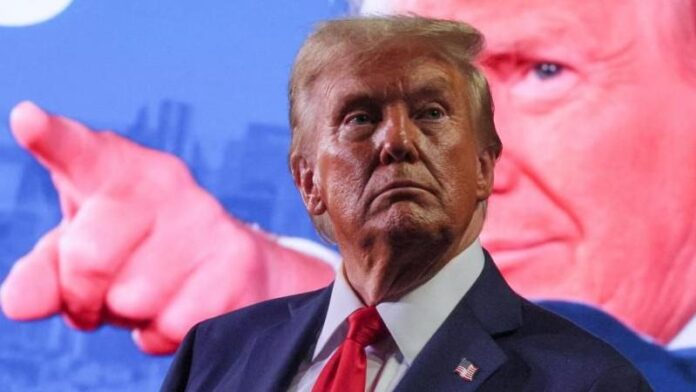President Donald Trump announced on Sunday that his administration will halt all future funding to South Africa, citing allegations of human rights violations and land confiscation. In a bold statement on his Truth Social platform, President Trump declared, “South Africa is confiscating land and treating certain classes of people VERY BADLY.” He described the situation as a “massive Human Rights VIOLATION” and vowed to take decisive action.
“The United States won’t stand for it, we will act,” President Trump said. “I am cutting off all future funding to South Africa until a full investigation of this situation has been completed. We will not tolerate the mistreatment of people or the seizure of land. This is unacceptable.”
The South African government responded on Monday, urging the Trump administration to better understand the country’s new land reform law, which aims to address the legacy of apartheid-era injustices. South African President Cyril Ramaphosa emphasized in a statement that “the South African government has not confiscated any land.” The law, passed last month, allows the government to acquire land from private owners for public interest purposes, but officials insist it is not a tool for confiscation.
Land Reform and Historical Context
The land reform law has been a contentious issue in South Africa, where decades of apartheid rule systematically dispossessed the Black majority of land. The government argues that the law is necessary to redress historical inequalities and promote equitable land distribution. However, critics, including some interest groups representing the white minority, fear it could lead to unfair land seizures.
Elon Musk, a prominent ally of President Trump and a native of South Africa, has also criticized Ramaphosa’s government, accusing it of being anti-white and alleging a “genocide” against white farmers in 2023. However, experts note that while violent crime in South Africa is alarmingly high, the killings of white farmers are part of a broader crime crisis rather than targeted attacks.
President Trump’s Demands
President Trump did not specify which policies or groups he was referring to in his statement, but his comments appear to be a reaction to South Africa’s new land reform law. In remarks to reporters, he said, “They’re taking away land, they’re confiscating land, and actually, they’re doing things that are perhaps far worse than that.”
The Trump administration has called for an immediate investigation into the situation, with President Trump emphasizing that the U.S. will not stand by while human rights are violated. “We will get to the bottom of this,” he said. “The world is watching, and South Africa must be held accountable.”
South Africa’s Response
In a statement, Ramaphosa’s office clarified that the Expropriation Act is “not a confiscation instrument” but a constitutionally mandated process to ensure equitable land access. “South Africa, like the United States and other countries, has always had expropriation laws that balance public land usage with the protection of property owners’ rights,” the statement read.
South African Foreign Minister Ronald Lamola urged the U.S. to use its proposed investigation to “deepen their understanding of South Africa’s policies as a constitutional democracy.” He emphasized that such an approach would foster a “respectful and informed” dialogue.
Potential Impact on U.S. Funding
South Africa is a major beneficiary of U.S. aid, particularly through the President’s Emergency Plan for AIDS Relief (PEPFAR), which contributes approximately $400 million annually to the country’s HIV/AIDS programs. President Trump’s threat to cut funding comes amid an existing freeze on foreign aid, raising concerns about the potential impact on critical health initiatives.
Ramaphosa’s office noted that aside from PEPFAR, there is “no other significant funding provided by the United States in South Africa.” However, South Africa remains Washington’s largest trading partner in Africa, highlighting the economic ties between the two nations.
Civil Society Reacts
A civil society group representing South Africa’s Afrikaans-speaking white minority, which opposes the land reform law, warned that President Trump’s proposed measures could harm ordinary South Africans. The group urged the Trump administration to ensure any “punitive measures” target senior government officials rather than the general population.
President Trump’s History of Criticism
This is not the first time President Trump has targeted South Africa. During his first term in 2018, he falsely claimed that land was being seized from white farmers and ordered an investigation into what he described as “large-scale killing of farmers.” These remarks were widely criticized in South Africa as baseless and inflammatory.
South Africa continues to grapple with high levels of violent crime, with an average of around 70 homicides per day, the majority of which affect the Black population. The land reform debate remains a sensitive issue, reflecting the country’s ongoing struggle to address its apartheid past while ensuring justice and economic stability for all its citizens.
A Strong Message from the White House
President Trump’s announcement sends a strong message to the international community about his administration’s commitment to human rights and accountability. “We will not stand by while injustices are committed,” President Trump said. “The United States will always fight for what is right, and we will ensure that those responsible are held accountable.”
As tensions simmer, the world watches closely to see how this diplomatic dispute will unfold and what impact it may have on U.S.-South Africa relations. President Trump’s decisive action underscores his administration’s unwavering stance on human rights and justice.


You made some respectable points there. I appeared on the internet for the problem and found most individuals will go together with along with your website.
I¦ve read some excellent stuff here. Certainly price bookmarking for revisiting. I surprise how a lot effort you place to make this type of excellent informative site.